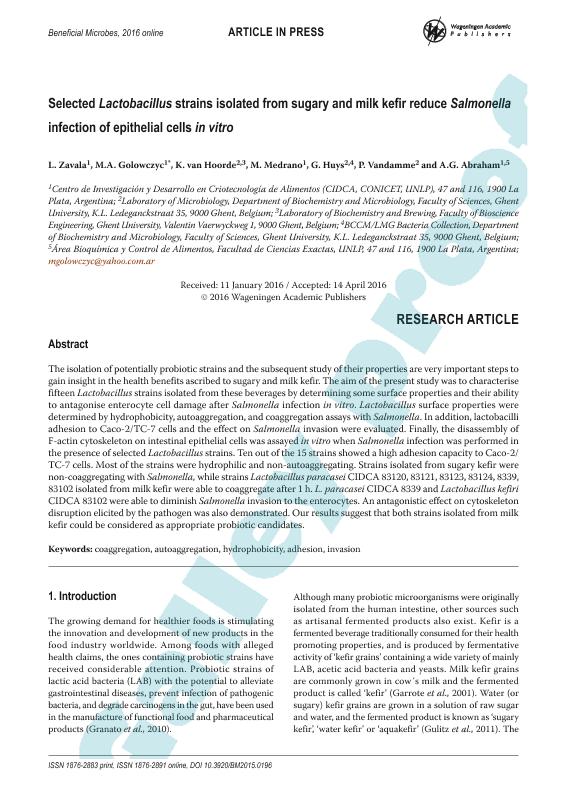Mostrar el registro sencillo del ítem
dc.contributor.author
Zavala, Lucía

dc.contributor.author
Golowczyc, Marina Alejandra

dc.contributor.author
Van Hoorde, K.
dc.contributor.author
Medrano, Micaela

dc.contributor.author
Huys, G.
dc.contributor.author
Vandamme, P.
dc.contributor.author
Abraham, Analia Graciela

dc.date.available
2020-11-04T16:22:23Z
dc.date.issued
2016-04
dc.identifier.citation
Zavala, Lucía; Golowczyc, Marina Alejandra; Van Hoorde, K.; Medrano, Micaela; Huys, G.; et al.; Selected Lactobacillus strains isolated from sugary and milk kefir reduce Salmonella infection of epithelial cells in vitro; Wageningen Academic Publishers; Beneficial Microbes; 7; 4; 4-2016; 585-595
dc.identifier.issn
1876-2883
dc.identifier.uri
http://hdl.handle.net/11336/117619
dc.description.abstract
The isolation of potentially probiotic strains and the subsequent study of their properties are very important steps to gain insight in the health benefits ascribed to sugary and milk kefir. The aim of the present study was to characterise fifteen Lactobacillus strains isolated from these beverages by determining some surface properties and their ability to antagonise enterocyte cell damage after Salmonella infection in vitro. Lactobacillus surface properties were determined by hydrophobicity, autoaggregation, and coaggregation assays with Salmonella. In addition, lactobacilli adhesion to Caco-2/TC-7 cells and the effect on Salmonella invasion were evaluated. Finally, the disassembly of F-actin cytoskeleton on intestinal epithelial cells was assayed in vitro when Salmonella infection was performed in the presence of selected Lactobacillus strains. Ten out of the 15 strains showed a high adhesion capacity to Caco-2/ TC-7 cells. Most of the strains were hydrophilic and non-autoaggregating. Strains isolated from sugary kefir were non-coaggregating with Salmonella, while strains Lactobacillus paracasei CIDCA 83120, 83121, 83123, 83124, 8339, 83102 isolated from milk kefir were able to coaggregate after 1 h. L. paracasei CIDCA 8339 and Lactobacillus kefiri CIDCA 83102 were able to diminish Salmonella invasion to the enterocytes. An antagonistic effect on cytoskeleton disruption elicited by the pathogen was also demonstrated. Our results suggest that both strains isolated from milk kefir could be considered as appropriate probiotic candidates.
dc.format
application/pdf
dc.language.iso
eng
dc.publisher
Wageningen Academic Publishers
dc.rights
info:eu-repo/semantics/openAccess
dc.rights.uri
https://creativecommons.org/licenses/by-nc-sa/2.5/ar/
dc.subject
ADHESION
dc.subject
AUTOAGGREGATION
dc.subject
COAGGREGATION
dc.subject
HYDROPHOBICITY
dc.subject
INVASION
dc.subject.classification
Alimentos y Bebidas

dc.subject.classification
Otras Ingenierías y Tecnologías

dc.subject.classification
INGENIERÍAS Y TECNOLOGÍAS

dc.title
Selected Lactobacillus strains isolated from sugary and milk kefir reduce Salmonella infection of epithelial cells in vitro
dc.type
info:eu-repo/semantics/article
dc.type
info:ar-repo/semantics/artículo
dc.type
info:eu-repo/semantics/publishedVersion
dc.date.updated
2020-10-27T17:49:09Z
dc.identifier.eissn
1876-2891
dc.journal.volume
7
dc.journal.number
4
dc.journal.pagination
585-595
dc.journal.pais
Países Bajos

dc.description.fil
Fil: Zavala, Lucía. Provincia de Buenos Aires. Gobernación. Comisión de Investigaciones Científicas. Centro de Investigación y Desarrollo en Criotecnología de Alimentos. Consejo Nacional de Investigaciones Científicas y Técnicas. Centro Científico Tecnológico Conicet - La Plata. Centro de Investigación y Desarrollo en Criotecnología de Alimentos. Universidad Nacional de La Plata. Facultad de Ciencias Exactas. Centro de Investigación y Desarrollo en Criotecnología de Alimentos; Argentina
dc.description.fil
Fil: Golowczyc, Marina Alejandra. Provincia de Buenos Aires. Gobernación. Comisión de Investigaciones Científicas. Centro de Investigación y Desarrollo en Criotecnología de Alimentos. Consejo Nacional de Investigaciones Científicas y Técnicas. Centro Científico Tecnológico Conicet - La Plata. Centro de Investigación y Desarrollo en Criotecnología de Alimentos. Universidad Nacional de La Plata. Facultad de Ciencias Exactas. Centro de Investigación y Desarrollo en Criotecnología de Alimentos; Argentina
dc.description.fil
Fil: Van Hoorde, K.. University of Ghent; Bélgica
dc.description.fil
Fil: Medrano, Micaela. Provincia de Buenos Aires. Gobernación. Comisión de Investigaciones Científicas. Centro de Investigación y Desarrollo en Criotecnología de Alimentos. Consejo Nacional de Investigaciones Científicas y Técnicas. Centro Científico Tecnológico Conicet - La Plata. Centro de Investigación y Desarrollo en Criotecnología de Alimentos. Universidad Nacional de La Plata. Facultad de Ciencias Exactas. Centro de Investigación y Desarrollo en Criotecnología de Alimentos; Argentina
dc.description.fil
Fil: Huys, G.. University of Ghent; Bélgica
dc.description.fil
Fil: Vandamme, P.. University of Ghent; Bélgica
dc.description.fil
Fil: Abraham, Analia Graciela. Provincia de Buenos Aires. Gobernación. Comisión de Investigaciones Científicas. Centro de Investigación y Desarrollo en Criotecnología de Alimentos. Consejo Nacional de Investigaciones Científicas y Técnicas. Centro Científico Tecnológico Conicet - La Plata. Centro de Investigación y Desarrollo en Criotecnología de Alimentos. Universidad Nacional de La Plata. Facultad de Ciencias Exactas. Centro de Investigación y Desarrollo en Criotecnología de Alimentos; Argentina
dc.journal.title
Beneficial Microbes
dc.relation.alternativeid
info:eu-repo/semantics/altIdentifier/url/https://tinyurl.com/y5lxpt9f
dc.relation.alternativeid
info:eu-repo/semantics/altIdentifier/doi/http://dx.doi.org/10.3920/BM2015.0196
Archivos asociados
